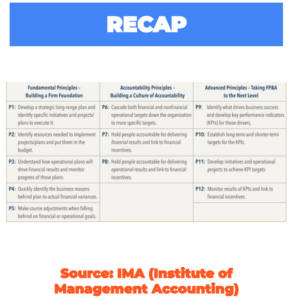I’d like you to reflect on these 12 FP&A principles and pick two you want to focus on in the next four weeks.
More than 700 businesses from all around the world took part in a survey that Lawrence Serven and the Institute of Management Accountants (IMA) created. The methodology used in this survey set it apart from others.
Previous studies concentrated on a certain approach before going backward to identify success stories. Instead, the IMA survey concentrated on the unique FP&A practices employed by the most profitable firms. Both their goals and their rivalry are routinely met or surpassed by these successful firms.
Do you want to be a better finance professional?
Table of Contents
12 FP&A Principles
#1: Principle: Develop a strategic long-range plan and identify specific initiatives and projects/plans to execute it.
#2: Principle: Identify resources needed to implement projects/plans and put them in the budget.
#3: Principle: Understand how operational plans will drive financial results and monitor the progress of those plans
#4: Principle: Quickly identify the business reasons behind plan-to-actual financial variances
#5: Principle: Make course adjustments when falling behind on financial or operational goals
#6: Principle: Cascade both financial and nonfinancial operational targets down the organization to more specific targets
#7: Principle: Hold people accountable for delivering financial results and link to financial incentives.
#8: Principle: Hold people accountable for delivering operational results and link to financial incentives
#9: Principle: Identify what drives business success and develop key performance indicators (KPIs) for those drivers
#10: Principle: Establish long-term and shorter-term targets for the KPIs
#11: Principle: Develop initiatives and operational projects to achieve KPI targets
#12: Principle: Monitor results of KPIs and link them to financial incentives
Here is a recap of the principles

The Bottom Line
In conclusion, the best-managed organizations pay just as much attention (if not more) to operational planning than they do to financial planning because they have a clear knowledge of how operational changes will affect financial performance.
People are responsible for achieving particular operational and financial results in the best-run businesses. They have the resources necessary to achieve those outcomes, and after presenting their case, those resources have been explicitly included in the budget.
Finally, if you want to know more about FP&A and finance, you can take my course.
This article is based on a publication from Lawrence Serven and Kip Krumwiede for the IMA | Institute of Management Accountants.










